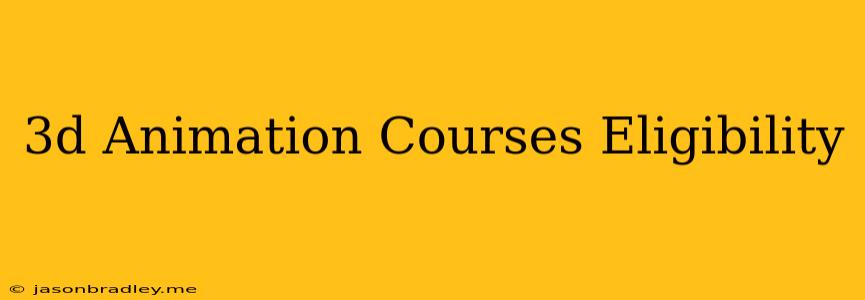Eligibility for 3D Animation Courses: What You Need to Know
3D animation is a rapidly growing field with immense potential for creativity and career growth. If you're passionate about bringing characters and stories to life, then pursuing a 3D animation course might be the perfect path for you. But before you dive in, it's important to understand the eligibility criteria for these courses.
Here's a breakdown of what you need to consider:
Educational Background:
- High School Diploma or Equivalent: This is typically the minimum requirement for most 3D animation programs.
- Prior Art or Design Experience: While not always mandatory, having a background in art, design, or visual media can be advantageous. This could include:
- Drawing and Sketching: Understanding basic anatomy, perspective, and composition is beneficial.
- Digital Art Skills: Experience with programs like Photoshop or Illustrator can be helpful for creating textures and concept art.
- Basic Computer Skills: Familiarity with operating systems, file management, and internet navigation is essential for working with animation software.
Technical Skills:
- 3D Software Proficiency: Most 3D animation courses require students to have some basic knowledge of industry-standard software like:
- Maya: A powerful and widely used program for modeling, animation, and rendering.
- 3ds Max: Another popular software with advanced features for complex scenes and simulations.
- Blender: A free and open-source alternative that is becoming increasingly popular.
- Software Familiarity: Even if you don't have extensive experience, it's helpful to demonstrate an understanding of the principles and techniques involved in 3D software.
Portfolio Requirements:
- Demonstrate Your Skills: Many 3D animation programs require applicants to submit a portfolio showcasing their creative abilities and technical skills. This could include:
- Personal Projects: Create short animations, character models, or 3D environments to highlight your skills.
- Concept Art: Design characters, props, or scenes to demonstrate your visual storytelling abilities.
- Traditional Artworks: Include sketches, drawings, or paintings to showcase your understanding of form, composition, and light.
Other Factors:
- Motivation and Passion: 3D animation requires dedication and a strong passion for the art form.
- Problem-Solving Skills: You'll need the ability to troubleshoot technical issues and creatively resolve challenges.
- Communication and Collaboration: Working in a team is common in the industry, so good communication and collaboration skills are valuable.
Remember: Each 3D animation course or program may have specific eligibility requirements. Thoroughly research the programs you are interested in to understand their admission criteria and prepare accordingly. By meeting the requirements and demonstrating your passion and skills, you can increase your chances of being accepted into a program and taking your 3D animation journey to the next level.
